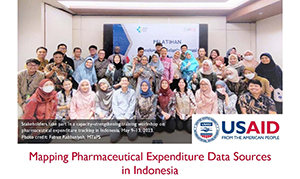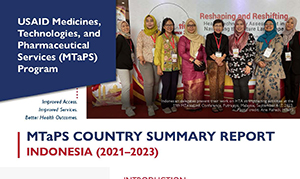Challenges
Indonesia is reaching universal health coverage (UHC) with its national health insurance program, Jaminan Kesehatan Nasional (JKN) covering close to 84% of the Indonesian population but its sustainability is a challenge. An extensive benefits package, increased utilization of the program, use of expensive medical technology, and rising expenditures have led to budget deficits in recent years. Further, the global financial support for vertical disease programs, including HIV and tuberculosis, is expected to decline as the country’s economy continues to grow. There is, thus, an increasing need to mobilize domestic resources for these programs, improve the efficiency of pharmaceutical resource allocation within JKN, and integrate funding for vertical disease medical products into the national insurance system.
MTaPS’ Support
MTaPS supports Indonesia’s Ministry of Health to build the country’s pharmaceutical systems, focusing on financing optimization to increase access to health technologies for its population and improve health outcomes for the priority areas of maternal and newborn health and tuberculosis. The program’s approach to achieve these outcomes includes strengthening the Government’s ability to institutionalize transparent and evidence-based decision-making, building its capacity to use robust information to define and cost pharmaceutical coverage, promoting pharmaceutical expenditure tracking to improve purchasing value, and strengthening pharmaceutical sector governance.
MTaPS’ support in Indonesia is aligned along the following two primary objectives.
- Strengthen the Institutionalization of Evidence-Informed Decision-Making for Resource Allocation
MTaPS is assisting the Indonesian Health Technology Assessment Committee (InaHTAC), established by the Ministry of Health to provide health policy recommendations for prioritizing health technologies for benefit package, to strengthen HTA infrastructure and processes for a robust, transparent, and accountable HTA program. MTaPS is working in close coordination with numerous partners, such as Australia’s Department of Foreign Affairs and Trade, PATH, United Nations Development Programme, WHO, and the Gates Foundation-funded International Decision Support Initiative through Thailand’s HTA agency, the Health Intervention Technology Assessment Program, to ensure complementarity and collaboration, as the country develops its 10-year roadmap for scaling up and institutionalizing HTA in Indonesia, which could ensure sustainable UHC aligned with USAID’s priorities, including maternal and newborn health and TB care.
- Promote Transparency in Pharmaceutical Expenditure Tracking to Improve Value in Purchasing
MTaPS, along with the USAID-funded Local Health System Sustainability Project, is building the capacity of Indonesia’s team for national health accounts (NHA)—the entity responsible for systematic, comprehensive, and consistent monitoring of resource flows in a country’s health system—for tracking and compiling pharmaceutical expenditure data to inform policy making. As part of the activity, MTaPS is landscaping pharmaceutical expenditure data sources in the country to build NHA’s capacity to develop a comprehensive picture of pharmaceutical spending in the country.
Achieving greater transparency in the financing and management of pharmaceuticals will create accountability in resource allocation and provide a lever for efficient mobilization of resources and avoidance of waste, thus improving disease management within the existing resources.




